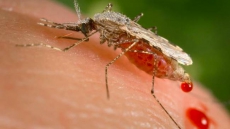ORONTO — Canada is in the midst of the flu season, with cases mounting across the country. Here are answers to some commonly asked questions about influenza.
WHAT IS FLU?
The flu is a contagious respiratory disease caused by the influenza virus, which infects the nose, throat and lungs. Infection can cause mild to severe illness, and in some cases lead to hospitalization and even death.
WHAT ARE SYMPTOMS OF FLU?
Fever, runny nose, sore throat, cough, muscle or body aches, headache and fatigue. Some people may have vomiting and diarrhea, although those symptoms are more common in children.
HOW DOES FLU SPREAD?
Influenza viruses are believed to spread from one person to another mainly by air-borne droplets when infected people cough, sneeze or talk. Touching a surface or object contaminated by the virus and then touching one's mouth, eyes or nose can also lead to infection.

HOW SOON DO SYMPTOMS BEGIN?
Symptoms begin about one to four days after exposure — on average, in about two days.
HOW LONG IS A PERSON CONTAGIOUS?
Flu can be passed to someone else even before symptoms appear. Most adults may be able to infect others beginning one day before symptoms develop and up to five to seven days after getting sick. Some people, especially young children and those with weakened immune systems, may be infectious for even longer.
HOW DO I KNOW IF IT'S FLU OR A COLD?
Influenza and the common cold are caused by different viruses, but both share some common symptoms. However, fever is rare with a cold and body aches, if they occur, are generally mild, while those associated with flu can be intense. Extreme fatigue is common with the flu but unusual with a cold.
HOW CAN I PROTECT MYSELF FROM GETTING FLU?
Infectious diseases experts say the best way to prevent infection is to get a seasonal flu vaccination each year. Other preventive measures — staying away from people who are sick, covering the mouth and nose when coughing and sneezing, and frequent hand-washing — also help slow the spread of influenza.


